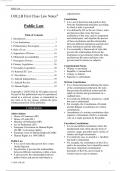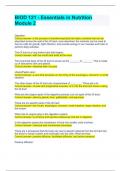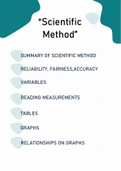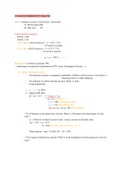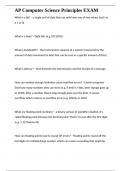20 Jan 2024
Public Law
organisations.
®
UOLLB First Class Law Notes
Constitution
It is a set of doctrines and practices that
form the fundamental principles according
Public Law to which a state is governed.
It is defined by HL as the set of laws, rules
and practices that create the basic
Table of Contents institutions of the state, and its component
1. Introduction ................................................ 1 and related parts, and stipulate the powers
2. Core Institutions ......................................... 3 of those institutions and the relationship
between different institutions and between
3. Parliamentary Sovereignty ......................... 8 those institutions and the individual.
4. Rule of Law.............................................. 13 It is essentially a framework of rules that
5. Separation of Powers ............................... 16 governs the relationships between the
institutions of government within the state,
6. Ministerial Accountability ....................... 19 and between the state (and those who
7. Prerogative Powers .................................. 22 govern) and its citizens or subjects.
8. Primary Legislation.................................. 26
Constitutional Forms
9. Secondary Legislation .............................. 28 Written vs unwritten
10. Retained EU Law ................................... 31 Republic vs monarchical
11. Devolution .............................................. 36 Unitary vs federal
Supreme vs subordinate
12. Judicial Independence ............................ 39
13. Judicial Review ...................................... 42 Written Constitution
14. Human Rights ........................................ 55 It is a formal document defining the nature
of the constitutional settlement, the rules
Copyright © 2024 UOLLB. All rights reserved. that governs the political system and the
No part of this publication may be reproduced, rights of citizens and governments in a
stored in a retrieval system, or transmitted in codified form.
any form or by any means, without the prior It is relatively difficult to amend (i.e. rigid)
written permission of the publisher. but easy to understand.
For example, the Constitution of Ireland
1. Introduction and the Belgian Constitution are written
constitutions.
Abbreviations Amendment of a written constitution often
House of Commons (HC) requires a referendum which is a national
House of Lords (HL) vote on a single question by the public.
Member of Parliament (MP)
Act of Parliament (AP) Unwritten Constitution
European Convention on Human Rights It is an uncodified constitution where the
(ECHR / Convention rights) fundamental rules often take the form of
European Court of Human Rights (ECtHR) customs, usage, precedent and a variety of
Human Rights Act 1998 (HRA) statutes and legal instruments.
It is relatively easy to amend (i.e. flexible)
Public Law but hard to understand.
It is a set of rules that govern how a state For example, the constitution of the UK is
should function. said to be unwritten, but it should be noted
In particular, it governs the relationships that many important constitutional
between different institutions within a state. principles of the UK can be found in
It also governs the relationships between written sources such as statutes.
public bodies and private individuals or
© 2024 UOLLB 1
, 20 Jan 2024
Public Law
Republican Constitution For example, the Basic Law of Hong Kong
The Head of State is elected by the people. is the de facto constitution of Hong Kong
A republic is a form of government in but it is subordinate to the Constitution of
which supreme power is held by the people the People’s Republic of China.
and their elected representatives.
For example, the French Constitution is a UK Constitution
republic constitution. It is largely unwritten and uncodified, so it
is essentially flexible.
Constitutional Monarchy Parliament may alter the constitution at
It is a form of government in which a will.
monarch acts as head of state within the The monarch is the Head of State, and the
parameters of a written, unwritten or monarchical powers are exercised by the
blended constitution. elected government.
Unlike absolute monarchy, the monarch is The government is headed by the Prime
not the only one to decide. Minister.
It may grant substantial discretionary It has become multi-layered system that
powers to the monarch such as that of diffuses power to constituent nations
Monaco, Morocco and Jordan. recently through devolution.
The monarch may retain significantly less It does not clearly define the separation of
personal discretion in the exercise of powers (i.e. executive, legislature and
authority, such as the UK, and the judiciary).
Netherlands, and Japan.
US Constitution
Unitary Constitution Its amendment is very difficult because any
It is a single constitution that governs all amendment requires two-thirds majority
the constituents of the nation. vote in both the Senate and the House of
For example, the Constitution of the Representatives.
People’s Republic of China is a unitary It is written and codified.
constitution. It is a republican constitution with the Head
of State elected by the people.
Federal Constitution It is a federal constitution with the
It defines the powers of the federal devolution of powers to state governments.
government and state governments. It is a supreme constitution and not subject
It has overriding force in case of conflict to any external force.
between the federal and state governments. It clearly defines the separation of powers
It is usually adopted by states with a large (executive, legislature and judiciary).
land mass and diffuse population.
For example, the US Constitution is a Unwritten Nature of UK Constitution
federal constitution. The UK constitution has never been
defined through a basic constitutional
Supreme Constitution document.
It is not subject to any external superior Parliament is supreme in its law-making
force. power, and no limit can be imposed on
The constitutions of most sovereign nations Parliament.
are supreme constitutions. APs are the constitutional statues which
can also be amended by Parliament at will
Subordinate Constitution without any special procedure.
It is drafted and introduced by external Rules and procedures relating to the
sovereign power and hence subject to principal institutions of the state are
external superior forces. available in APs.
It can be amended or repealed by that The UK constitutional law is not distinct
external power without the need to hold a from other law but is mingled with the rest
referendum. of the law in statutes and subordinate
© 2024 UOLLB 2
, 20 Jan 2024
Public Law
legislation in the common law and command a majority in the HC.
decisions of judges. The civil service and public service
Examples of statutes of constitutional institutions deliver economic, social and
significance include the Bill of Rights legal rights to UK residents.
1689, Acts of Union 1707 and 1800, Act of
Settlement 1701, Parliament Acts 1911 and Three Branches of State Powers
1949, Human Rights Act 1998, Scotland Legislative branch – also known as the
Act, Northern Ireland Act and Government legislature, it is an assembly of elected
of Wales Act 1998. legislators, with the authority to make,
Examples of judicial decisions of amend, and repeal laws, and to monitor and
constitutional significance include R steer governing actions, with budgetary
(Miller) v Secretary of State for Exiting authority. Its major participants include
European Union (2017) which clarified that both Houses of Parliament.
judges can recognise the operation of a Executive branch – it is the part of
political convention when deciding a legal government that enforces law, and has
question but cannot give legal rulings on its responsibility for governing the state. The
operation or scope as those matters are UK Government is responsible for
determined within the political world. implementing and administering the laws
Therefore, it is more accurate to refer to the passed by Parliament. Its major participants
constitution of the UK as uncodified rather include the Prime Minister, Cabinet, and
than unwritten as there are many important civil service.
written sources of the UK constitution. Judicial branch – also known as the
judiciary, it is the system of courts that
Direct Democracy adjudicates legal disputes and interprets,
Also known as pure democracy, it is a form defends, and applies the law. It plays a
of democracy in which the electorate (i.e. crucial role in ensuring that the rule of law
all the people who can vote) directly decide is upheld and legal disputes are resolved
on policy initiatives pass laws without fairly. Its key participants include the
legislative representatives as proxies. Supreme Court, senior courts, lower courts,
It is difficult to put into practice but a and tribunals.
referendum that allows the electorate to
vote on a particular proposal or issue is an UK Government
example of direct democracy. It is the central government of the UK,
domestically referred to as His Majesty’s
Representative Democracy Government.
Also known as indirect democracy, it is a The system of government in the UK is a
form of democracy in which people vote parliamentary democracy where voters in
for representatives who then decide policy each constituency elect their MP in a
initiatives and pass laws on behalf of them. general election.
It is the most common form of democracy The government is led by the Prime
adopted by most democratic countries. Minister who selects all the other ministers.
In the UK, the electorate vote for their MPs The Cabinet is a group of 22 people led and
to represent them in Parliament. chosen by the Prime Minister who are the
main decision-makers in the government.
2. Core Institutions The UK government includes all
government departments and their arm’s
Major UK Institutions length bodies such as executive agencies,
Parliament is the sovereign entity with two non-departmental public bodies, non-
chambers: the HL and the HC. ministerial departments, and any other non-
The judiciary interprets the law but has no market bodies controlled and mainly
power to strike down an AP. financed by them.
The executive branch of government is led Currently, there are currently 23 ministerial
by the Prime Minister who must be able to departments, 20 non-ministerial
© 2024 UOLLB 3
, 20 Jan 2024
Public Law
departments and 413 agencies and other Civil Service
public bodies. It is a sector of government composed
mainly of career civil servants hired on
Prime Minister professional merit rather than appointed or
He is the head of the UK government and elected, whose institutional tenure typically
must be a member of the HC. survives transitions of political leadership.
He is normally the leader of the largest Civil servants are employees of the Crown
political party in the HC. and their employment is regulated by
His powers are derived from prerogative statutes and prerogatives.
powers given by the monarch. They serve as political advisors but should
remain politically neutral.
Secretary of State
He is a senior government official who is Parliament
appointed as the head of a department or It is legislative branch that represents the
ministry and bears ultimate responsibility electorate, makes laws and oversees the
for the actions of his department. government via hearings and inquiries.
This title is typically held by Cabinet It plays a central role in the law-making
ministers in charge of government process, governance, and representing the
departments. interests of the people.
While most departments are run by a It is named differently in different
secretary of state, there can be some countries, for example, the Congress in the
exceptions, for example, the Chancellor of US, the Duma in Russia, the Diet in Japan.
the Exchequer heads HM Treasury.
Act of Parliament
Minister of State It is the primary legislation that creates a
He is a mid-tier government official who is new law or changes or abolish an existing
not a member of the Cabinet, but still holds one.
a significant role in government. An Act is a Bill that has been approved by
He is typically appointed to assist a senior both the HC and the HL and has been
Cabinet minister such as a secretary of state given Royal Assent by the Monarch.
with specific policy areas or to lead specific APs make up what is known as statute law
government departments or agencies. in the UK.
He may also be responsible for
representing the government in certain Relationship between Government and
regions or on specific issues. Parliament
Senior Ministers of State can be invited to The government derives its authority from
attend cabinet on a regular basis at the Parliament and must have the support of
Prime Minister’s discretion, though they the majority in the HC to remain in office.
are not technically full members. The government is typically formed by the
political party or coalition with the most
Parliamentary Under-Secretary of State seats in the HC after a general election.
Also called Parliamentary Secretary, he is The government is accountable to
the lowest of three tiers of government Parliament, particularly to the HC.
minister, immediately junior to a minister The government must regularly report to
of state. Parliament, answer questions, and defend
He is typically an MP who is appointed to its policies and actions.
assist the secretary of state or minister of Parliament reviews and debates
state in a particular department. government proposals, including bills,
He are responsible for supporting the work budgets, and policies.
of the department, advising the secretary of Parliament has the power to amend, reject,
state on policy matters, and representing or approve government initiatives.
the department in parliamentary debates Parliament acts as a check on the
and other public forum. government’s powers.
© 2024 UOLLB 4
Public Law
organisations.
®
UOLLB First Class Law Notes
Constitution
It is a set of doctrines and practices that
form the fundamental principles according
Public Law to which a state is governed.
It is defined by HL as the set of laws, rules
and practices that create the basic
Table of Contents institutions of the state, and its component
1. Introduction ................................................ 1 and related parts, and stipulate the powers
2. Core Institutions ......................................... 3 of those institutions and the relationship
between different institutions and between
3. Parliamentary Sovereignty ......................... 8 those institutions and the individual.
4. Rule of Law.............................................. 13 It is essentially a framework of rules that
5. Separation of Powers ............................... 16 governs the relationships between the
institutions of government within the state,
6. Ministerial Accountability ....................... 19 and between the state (and those who
7. Prerogative Powers .................................. 22 govern) and its citizens or subjects.
8. Primary Legislation.................................. 26
Constitutional Forms
9. Secondary Legislation .............................. 28 Written vs unwritten
10. Retained EU Law ................................... 31 Republic vs monarchical
11. Devolution .............................................. 36 Unitary vs federal
Supreme vs subordinate
12. Judicial Independence ............................ 39
13. Judicial Review ...................................... 42 Written Constitution
14. Human Rights ........................................ 55 It is a formal document defining the nature
of the constitutional settlement, the rules
Copyright © 2024 UOLLB. All rights reserved. that governs the political system and the
No part of this publication may be reproduced, rights of citizens and governments in a
stored in a retrieval system, or transmitted in codified form.
any form or by any means, without the prior It is relatively difficult to amend (i.e. rigid)
written permission of the publisher. but easy to understand.
For example, the Constitution of Ireland
1. Introduction and the Belgian Constitution are written
constitutions.
Abbreviations Amendment of a written constitution often
House of Commons (HC) requires a referendum which is a national
House of Lords (HL) vote on a single question by the public.
Member of Parliament (MP)
Act of Parliament (AP) Unwritten Constitution
European Convention on Human Rights It is an uncodified constitution where the
(ECHR / Convention rights) fundamental rules often take the form of
European Court of Human Rights (ECtHR) customs, usage, precedent and a variety of
Human Rights Act 1998 (HRA) statutes and legal instruments.
It is relatively easy to amend (i.e. flexible)
Public Law but hard to understand.
It is a set of rules that govern how a state For example, the constitution of the UK is
should function. said to be unwritten, but it should be noted
In particular, it governs the relationships that many important constitutional
between different institutions within a state. principles of the UK can be found in
It also governs the relationships between written sources such as statutes.
public bodies and private individuals or
© 2024 UOLLB 1
, 20 Jan 2024
Public Law
Republican Constitution For example, the Basic Law of Hong Kong
The Head of State is elected by the people. is the de facto constitution of Hong Kong
A republic is a form of government in but it is subordinate to the Constitution of
which supreme power is held by the people the People’s Republic of China.
and their elected representatives.
For example, the French Constitution is a UK Constitution
republic constitution. It is largely unwritten and uncodified, so it
is essentially flexible.
Constitutional Monarchy Parliament may alter the constitution at
It is a form of government in which a will.
monarch acts as head of state within the The monarch is the Head of State, and the
parameters of a written, unwritten or monarchical powers are exercised by the
blended constitution. elected government.
Unlike absolute monarchy, the monarch is The government is headed by the Prime
not the only one to decide. Minister.
It may grant substantial discretionary It has become multi-layered system that
powers to the monarch such as that of diffuses power to constituent nations
Monaco, Morocco and Jordan. recently through devolution.
The monarch may retain significantly less It does not clearly define the separation of
personal discretion in the exercise of powers (i.e. executive, legislature and
authority, such as the UK, and the judiciary).
Netherlands, and Japan.
US Constitution
Unitary Constitution Its amendment is very difficult because any
It is a single constitution that governs all amendment requires two-thirds majority
the constituents of the nation. vote in both the Senate and the House of
For example, the Constitution of the Representatives.
People’s Republic of China is a unitary It is written and codified.
constitution. It is a republican constitution with the Head
of State elected by the people.
Federal Constitution It is a federal constitution with the
It defines the powers of the federal devolution of powers to state governments.
government and state governments. It is a supreme constitution and not subject
It has overriding force in case of conflict to any external force.
between the federal and state governments. It clearly defines the separation of powers
It is usually adopted by states with a large (executive, legislature and judiciary).
land mass and diffuse population.
For example, the US Constitution is a Unwritten Nature of UK Constitution
federal constitution. The UK constitution has never been
defined through a basic constitutional
Supreme Constitution document.
It is not subject to any external superior Parliament is supreme in its law-making
force. power, and no limit can be imposed on
The constitutions of most sovereign nations Parliament.
are supreme constitutions. APs are the constitutional statues which
can also be amended by Parliament at will
Subordinate Constitution without any special procedure.
It is drafted and introduced by external Rules and procedures relating to the
sovereign power and hence subject to principal institutions of the state are
external superior forces. available in APs.
It can be amended or repealed by that The UK constitutional law is not distinct
external power without the need to hold a from other law but is mingled with the rest
referendum. of the law in statutes and subordinate
© 2024 UOLLB 2
, 20 Jan 2024
Public Law
legislation in the common law and command a majority in the HC.
decisions of judges. The civil service and public service
Examples of statutes of constitutional institutions deliver economic, social and
significance include the Bill of Rights legal rights to UK residents.
1689, Acts of Union 1707 and 1800, Act of
Settlement 1701, Parliament Acts 1911 and Three Branches of State Powers
1949, Human Rights Act 1998, Scotland Legislative branch – also known as the
Act, Northern Ireland Act and Government legislature, it is an assembly of elected
of Wales Act 1998. legislators, with the authority to make,
Examples of judicial decisions of amend, and repeal laws, and to monitor and
constitutional significance include R steer governing actions, with budgetary
(Miller) v Secretary of State for Exiting authority. Its major participants include
European Union (2017) which clarified that both Houses of Parliament.
judges can recognise the operation of a Executive branch – it is the part of
political convention when deciding a legal government that enforces law, and has
question but cannot give legal rulings on its responsibility for governing the state. The
operation or scope as those matters are UK Government is responsible for
determined within the political world. implementing and administering the laws
Therefore, it is more accurate to refer to the passed by Parliament. Its major participants
constitution of the UK as uncodified rather include the Prime Minister, Cabinet, and
than unwritten as there are many important civil service.
written sources of the UK constitution. Judicial branch – also known as the
judiciary, it is the system of courts that
Direct Democracy adjudicates legal disputes and interprets,
Also known as pure democracy, it is a form defends, and applies the law. It plays a
of democracy in which the electorate (i.e. crucial role in ensuring that the rule of law
all the people who can vote) directly decide is upheld and legal disputes are resolved
on policy initiatives pass laws without fairly. Its key participants include the
legislative representatives as proxies. Supreme Court, senior courts, lower courts,
It is difficult to put into practice but a and tribunals.
referendum that allows the electorate to
vote on a particular proposal or issue is an UK Government
example of direct democracy. It is the central government of the UK,
domestically referred to as His Majesty’s
Representative Democracy Government.
Also known as indirect democracy, it is a The system of government in the UK is a
form of democracy in which people vote parliamentary democracy where voters in
for representatives who then decide policy each constituency elect their MP in a
initiatives and pass laws on behalf of them. general election.
It is the most common form of democracy The government is led by the Prime
adopted by most democratic countries. Minister who selects all the other ministers.
In the UK, the electorate vote for their MPs The Cabinet is a group of 22 people led and
to represent them in Parliament. chosen by the Prime Minister who are the
main decision-makers in the government.
2. Core Institutions The UK government includes all
government departments and their arm’s
Major UK Institutions length bodies such as executive agencies,
Parliament is the sovereign entity with two non-departmental public bodies, non-
chambers: the HL and the HC. ministerial departments, and any other non-
The judiciary interprets the law but has no market bodies controlled and mainly
power to strike down an AP. financed by them.
The executive branch of government is led Currently, there are currently 23 ministerial
by the Prime Minister who must be able to departments, 20 non-ministerial
© 2024 UOLLB 3
, 20 Jan 2024
Public Law
departments and 413 agencies and other Civil Service
public bodies. It is a sector of government composed
mainly of career civil servants hired on
Prime Minister professional merit rather than appointed or
He is the head of the UK government and elected, whose institutional tenure typically
must be a member of the HC. survives transitions of political leadership.
He is normally the leader of the largest Civil servants are employees of the Crown
political party in the HC. and their employment is regulated by
His powers are derived from prerogative statutes and prerogatives.
powers given by the monarch. They serve as political advisors but should
remain politically neutral.
Secretary of State
He is a senior government official who is Parliament
appointed as the head of a department or It is legislative branch that represents the
ministry and bears ultimate responsibility electorate, makes laws and oversees the
for the actions of his department. government via hearings and inquiries.
This title is typically held by Cabinet It plays a central role in the law-making
ministers in charge of government process, governance, and representing the
departments. interests of the people.
While most departments are run by a It is named differently in different
secretary of state, there can be some countries, for example, the Congress in the
exceptions, for example, the Chancellor of US, the Duma in Russia, the Diet in Japan.
the Exchequer heads HM Treasury.
Act of Parliament
Minister of State It is the primary legislation that creates a
He is a mid-tier government official who is new law or changes or abolish an existing
not a member of the Cabinet, but still holds one.
a significant role in government. An Act is a Bill that has been approved by
He is typically appointed to assist a senior both the HC and the HL and has been
Cabinet minister such as a secretary of state given Royal Assent by the Monarch.
with specific policy areas or to lead specific APs make up what is known as statute law
government departments or agencies. in the UK.
He may also be responsible for
representing the government in certain Relationship between Government and
regions or on specific issues. Parliament
Senior Ministers of State can be invited to The government derives its authority from
attend cabinet on a regular basis at the Parliament and must have the support of
Prime Minister’s discretion, though they the majority in the HC to remain in office.
are not technically full members. The government is typically formed by the
political party or coalition with the most
Parliamentary Under-Secretary of State seats in the HC after a general election.
Also called Parliamentary Secretary, he is The government is accountable to
the lowest of three tiers of government Parliament, particularly to the HC.
minister, immediately junior to a minister The government must regularly report to
of state. Parliament, answer questions, and defend
He is typically an MP who is appointed to its policies and actions.
assist the secretary of state or minister of Parliament reviews and debates
state in a particular department. government proposals, including bills,
He are responsible for supporting the work budgets, and policies.
of the department, advising the secretary of Parliament has the power to amend, reject,
state on policy matters, and representing or approve government initiatives.
the department in parliamentary debates Parliament acts as a check on the
and other public forum. government’s powers.
© 2024 UOLLB 4

